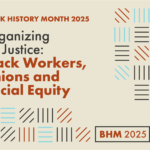
Canada’s unions are calling for increased vigilance and awareness to the growing risk of domestic violence amidst the coronavirus pandemic.
The recommendation that people stay in their homes, along with added financial pressure and stress, can elevate the risk of violence and further entrenches isolation, which increases opportunities for abusers to exert power and control.
Women’s shelters and transition houses across the country are doing their best to remain open for those fleeing domestic violence, despite the current challenges. Federal and provincial governments have announced some new spending to support these necessary services during this critical time.
We all have a role to play.
How to help someone you know or those suffering in your community
What should you do if you are concerned about a co-worker, friend or family member that you believe is experiencing abuse?
- Remind them that you care about their health and well-being.
- Encourage them to reach out to their local shelter to get support and to develop a safety plan.
- Keep the lines of communication open to reduce isolation.
- Union representatives who have been assisting members with workplace safety planning can work with them and a shelter worker to adapt it to the new context.
How can you help in your community?
- Consider donating to local shelters so they can continue to offer services during this crisis. Contact your local organization to find out how you can help.
What to do if you need help
- Reach out to any women’s shelter or helpline, which will provide information, support and referrals to other services. You do not need to seek shelter to get help.
- Even if leaving does not feel like an option, shelter workers can provide assistance with developing a safety plan, offer a listening ear and help you better understand your situation.
- If you belong to a union, create or adapt a workplace safety plan with your union representative. If you don’t belong to one, work with your employer and a shelter worker.
- If you are in immediate danger, call 911. You do not need to tell the 911 operator why you are calling if you are afraid of your partner’s reaction. Even if you just say “I would like to order a pizza”, police will come to your home.
Useful links
Sheltersafe provides information and can help identify a shelter in your community. Crisis and distress lines are available in most provinces and territories, and 211 can identify local sources of support in many communities.
Remember, employers must ensure that Employee Assistance Programs (EAPs) remain accessible during the pandemic. These may be useful for those experiencing violence right now.






